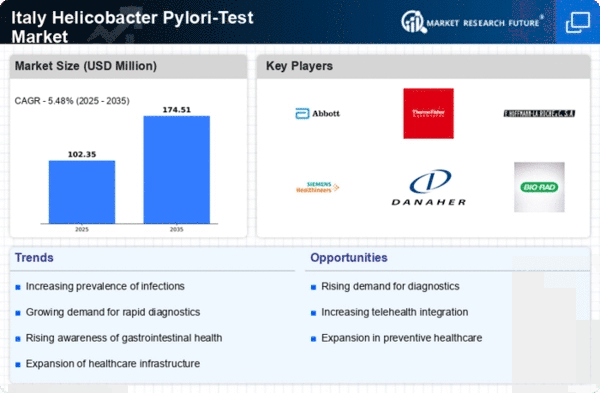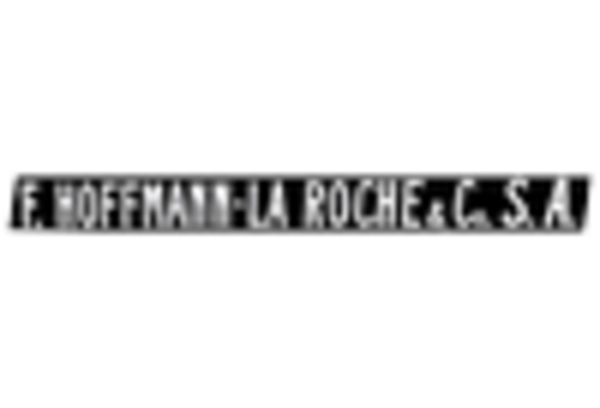Increased Healthcare Expenditure
Italy's healthcare expenditure has been on the rise, which positively influences the helicobacter pylori-test market. The Italian government has allocated substantial funds to improve healthcare services, including diagnostic testing. In 2025, healthcare spending is projected to reach approximately €200 billion, reflecting a commitment to enhancing public health. This increase in funding allows for better access to advanced diagnostic tools and technologies, facilitating the early detection of Helicobacter pylori infections. As healthcare facilities upgrade their testing capabilities, the demand for reliable and efficient testing methods is likely to grow. Additionally, increased public awareness about gastrointestinal health issues may lead to more individuals seeking testing, further driving market growth. Higher healthcare spending combined with a focus on preventive care creates a favorable environment for the helicobacter pylori-test market.
Growing Awareness of Gastrointestinal Health
There is a notable increase in public awareness regarding gastrointestinal health issues in Italy, which serves as a significant driver for the helicobacter pylori-test market. Educational campaigns and health initiatives have highlighted the importance of early detection and treatment of Helicobacter pylori infections. As individuals become more informed about the potential risks associated with untreated infections, they are more likely to seek testing. This shift in consumer behavior is supported by healthcare professionals who advocate for routine screening, especially in high-risk populations. The rising awareness is also reflected in the growing number of health seminars and workshops focused on digestive health. Consequently, this heightened awareness is expected to lead to an increase in testing rates, thereby positively impacting the helicobacter pylori-test market.
Regulatory Support for Diagnostic Innovations
Regulatory support for new diagnostic innovations is a crucial driver for the helicobacter pylori-test market. In Italy, regulatory bodies are increasingly recognizing the importance of rapid and accurate diagnostic tests for Helicobacter pylori infections. Streamlined approval processes for new testing methods encourage manufacturers to invest in research and development. This supportive regulatory environment fosters innovation, leading to the introduction of more effective and user-friendly testing solutions. As new tests receive regulatory approval, healthcare providers are more likely to adopt these advancements, thereby increasing the overall testing rates. Additionally, regulatory initiatives aimed at improving public health outcomes further emphasize the need for reliable diagnostic tools. The combination of regulatory support and a focus on innovation is expected to significantly impact the growth trajectory of the helicobacter pylori-test market.
Technological Innovations in Diagnostic Testing
Technological advancements in diagnostic testing are significantly influencing the helicobacter pylori-test market. Innovations such as non-invasive breath tests and rapid antigen detection methods are becoming increasingly popular in Italy. These technologies offer quicker results and improved patient comfort, which are essential factors for both healthcare providers and patients. The introduction of point-of-care testing devices allows for immediate diagnosis, reducing the need for laboratory-based testing and expediting treatment decisions. As these technologies become more widely adopted, they are likely to enhance the overall efficiency of testing processes. Furthermore, the integration of digital health solutions, such as telemedicine, facilitates remote consultations and follow-ups, further driving the demand for innovative testing methods. The continuous evolution of diagnostic technologies is expected to play a crucial role in shaping the future of the helicobacter pylori-test market.
Rising Prevalence of Helicobacter Pylori Infections
The increasing incidence of Helicobacter pylori infections in Italy is a primary driver for the helicobacter pylori-test market. Studies indicate that approximately 50% of the Italian population may be infected with this bacterium, leading to various gastrointestinal disorders. This high prevalence necessitates effective diagnostic testing, thereby boosting market demand. As awareness of the health implications associated with untreated infections grows, healthcare providers are more likely to recommend testing. Furthermore, the Italian healthcare system is adapting to these trends by integrating more comprehensive screening programs, which could potentially increase the number of tests conducted annually. The rising prevalence of related conditions, such as peptic ulcers and gastric cancer, further emphasizes the need for reliable testing solutions, thereby propelling the helicobacter pylori-test market forward.
















